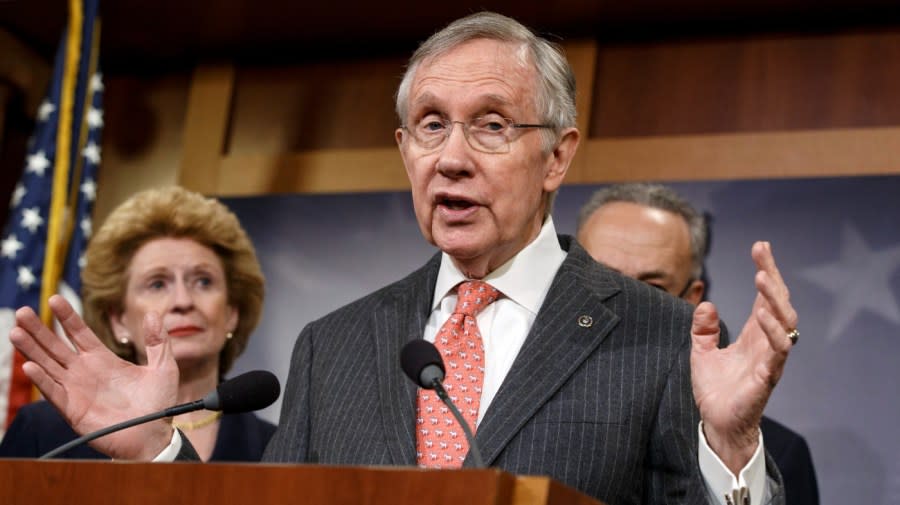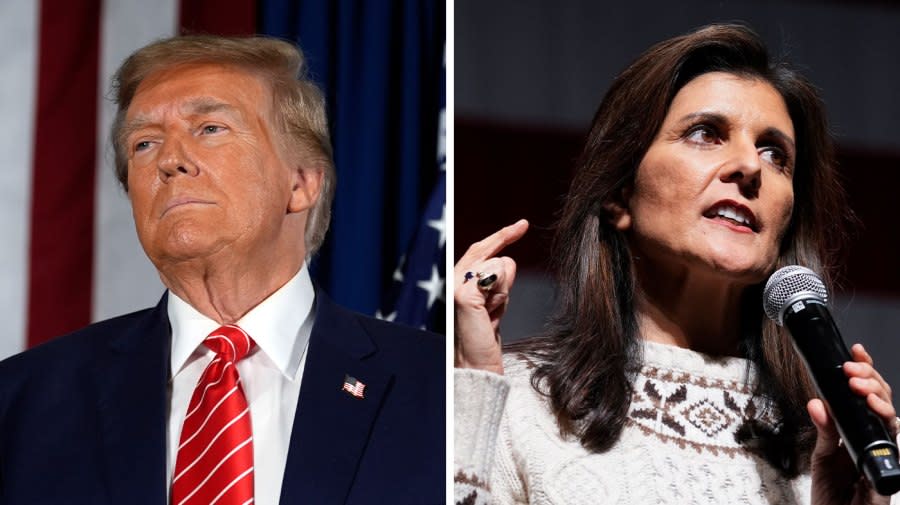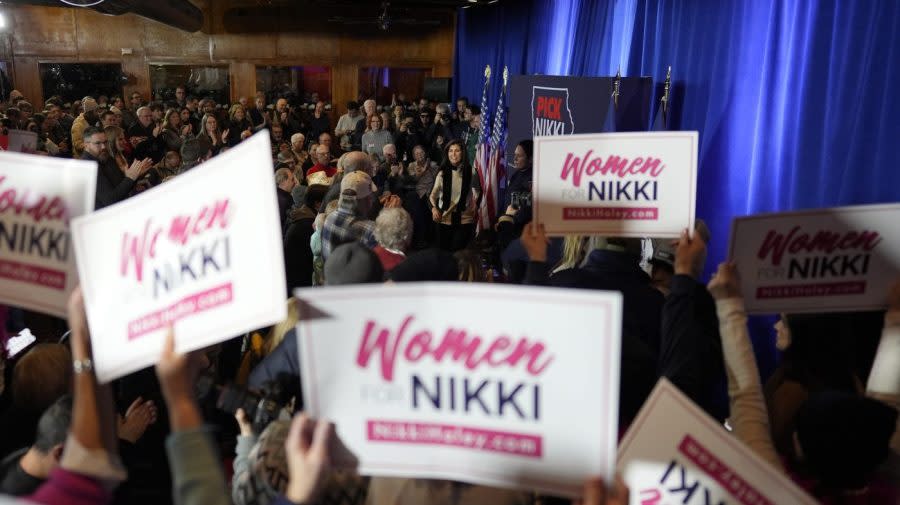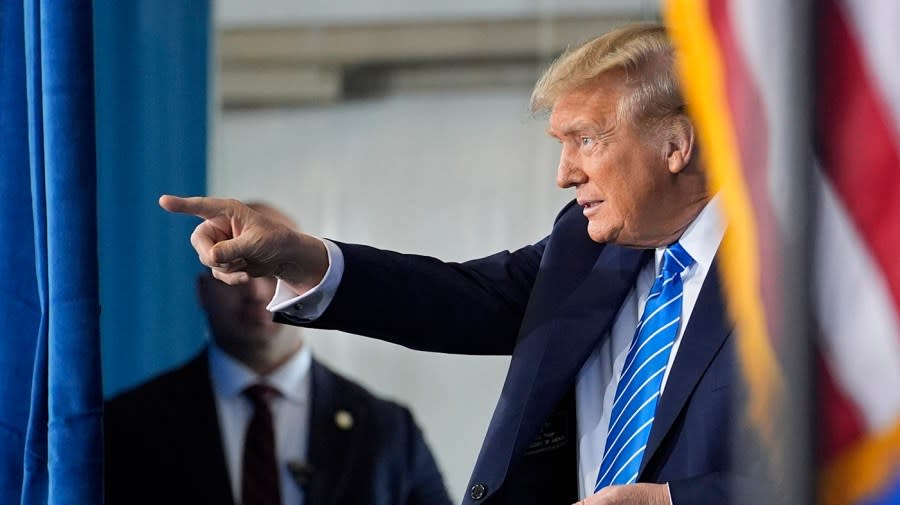Why Haley and Trump are on separate ballots in Nevada
- Oops!Something went wrong.Please try again later.
- Oops!Something went wrong.Please try again later.
Nevada Republicans will have the opportunity to go to the polls twice next week as former President Trump and Nikki Haley battle for the presidential nomination. However, only one of those ballots will actually matter.
The Silver State is holding caucuses and a primary next week — a scenario that has sparked confusion among voters, especially because the state GOP will only recognize the results of the caucuses.
The primary will be on Tuesday, Feb. 6, while the caucuses will be on Thursday, Feb. 8. The decision to hold both comes amid infighting in the state’s Republican Party and Democratic frustration over the traditional caucus method of selecting a presidential nominee.
Here are the key things to know about Nevada’s dueling contests:
Why is there a separate primary and caucus?

Senate Majority Leader Harry Reid of Nev., flanked by Sen. Debbie Stabenow, D-Mich., left, and Sen. Charles Schumer, D-N.Y., discuss Democrat legislative agenda during a news conference on Capitol Hill in Washington, Wednesday, March 26, 2014. Raising the minimum wage, pay inequity, and other issues affecting the middle class are at the heart of their “fair shot for everyone” plan. (AP Photo/J. Scott Applewhite)
The separate votes are a result of years of lobbying by Nevada Democrats to end the state’s 40-year tradition of presidential caucuses. The state Legislature established a primary in 2021 in a bipartisan effort led by Democrats, with the hopes both state parties would ditch their caucuses.
The anti-caucus effort was pushed by former Sen. Harry Reid (D-Nev.), who turned against the voting method after technical difficulties wreaked havoc on the 2020 Iowa Democratic caucuses. He believed the primary system would encourage higher turnout.
“My No. 1 priority is getting rid of the caucuses,” Reid told the Las Vegas Review-Journal in 2021. “They don’t work. It was proven in Iowa. We did OK here, but the system is so unfair.”
But the Nevada Republican Party rejected the change and decided to go forward with the caucuses anyway, keeping with the state’s long-held tradition.
While Nevada Democrats will follow the state-run primary on Feb. 6, the state GOP filed a lawsuit last year challenging the 2021 law in an attempt to strike the primary.
The lawsuit was dropped early this month after a judge concluded the state would not interfere in the party’s caucus process and would hold the legally mandated primary separately, with the primary being effectively meaningless for nomination purposes.
Will Haley and Trump appear on both ballots?

No.
Despite both candidates competing for votes in Nevada, they will not face each other because Haley is only on the ballot in the primary and Trump is only on the caucus ballot.
The state of Nevada is recognizing only the primary and essentially ignoring the caucuses, but it is not preventing candidates and voters from participating in both.
Nevada Gov. Joe Lombardo (R) announced he will vote in both races, once for Trump in the caucuses and again for “none of the above” in the primary. He has endorsed Trump for the presidential election.
But the state Republican Party announced in August it would boycott the primary and not allow candidates to participate in both. If a candidate decided to participate in the primary, they could not compete in the caucuses.
Accordingly, Trump filed for the caucuses and stayed off the primary ballot, while Haley filed for the primary. Candidates needed to pay a fee of $55,000 to be placed on the ballot for the caucuses.
This arrangement will have Haley as the only major candidate on the ballot on Tuesday and Trump as the only major candidate on Thursday. A few minor candidates and former candidates who have dropped out of the race will also appear on the ballots.
In the Democratic primary, also on Feb. 6, President Biden is joined on the ballot by long-shot candidate Marianne Williamson.
Which GOP contest actually matters for the nomination?

Republican presidential candidate former U.S. President Donald Trump delivers remarks during a campaign rally at the Reno-Sparks Convention Center on December 17, 2023 in Reno, Nevada. (Photo by Justin Sullivan/Getty Images)
The caucuses are the only contest of the two that will award delegates.
Although the state is acknowledging only the primary, the state party is ultimately in charge of awarding delegates. And because the Nevada GOP is running the caucus, candidates in that race will receive delegates, but not those running in the primary.
Top Stories from The Hill
Taylor Swift conspiracy theories engulf conservative social media
Speaker Johnson not dismissing border deal to help Trump: ‘That’s absurd’
House Republicans poised to torpedo GOP’s best chance in years to pass border bill
Retired conservative judge: ‘Trump disqualified himself’ from ballot
Nevada has 26 delegates to allocate to candidates, a relatively small total compared to many other states that have at least a dozen more.
Democrats will allocate the state’s delegates based on the winner of the primary.
If the primary doesn’t matter, why will Haley compete in it?

Supporters hold signs that say “Women for Nikki” as Republican presidential candidate former UN Ambassador Nikki Haley, center, speaks during a campaign event at Jethro’s BBQ in Ames, Iowa, Sunday, Jan. 14, 2024. (AP Photo/Carolyn Kaster)
Haley has not publicly stated why she chose to participate in the primary over the caucuses, but the caucuses have received some criticism for their process, with some Republicans arguing they have been rigged for Trump.
Lombardo has criticized the dueling contests, arguing last year that it would hurt the candidates and disenfranchise some voters. He has also slammed the state GOP’s rule preventing candidates competing in the primary from also competing in the caucuses.
The primary will give voters a larger amount of time to participate, with a week of early voting and mail-in ballots and same-day voter registration allowed. A voter can only file an absentee ballot in the caucuses if they have a disability, are an active service member or are a dependent.
Some have also raised objections to the close ties between Trump and the top officials leading the state’s Republican Party. Michael McDonald, the chair of the state party, served as a fake elector for Trump during the 2020 presidential election, falsely claiming Trump won the state.
McDonald on multiple occasions has introduced Trump at rallies, praising him and encouraging people to participate in the caucus.
But some Haley supporters have expressed frustration that she will not be on the ballot that counts.
“There’s no point in participating in the caucus,” one voter told The Las Vegas Review-Journal. “I can’t vote for my candidate. They’re basically disenfranchising me. And this is happening by my own Republican party. I’m very unhappy about it.”
Regardless, Nevada has not seemed to be much of a focus for Haley’s campaign. Following the New Hampshire primary last week, the former U.N. ambassador has shifted much of her attention to South Carolina’s primary, which is late next month.
Is the Nevada GOP’s nominee already decided then?

Republican presidential candidate former President Donald Trump motions before speaking at a campaign event Saturday, Jan. 27, 2024, in Las Vegas. (AP Photo/John Locher)
Trump has already declared victory in Nevada, claiming he has taken the state’s delegates even though the caucuses haven’t happened yet.
Although Trump is likely to win the caucuses and a majority of Nevada’s 26 delegates, the election result is not yet set. Pastor Ryan Binkley, a long-shot candidate from Texas, is also on the caucus ballot and can take a delegate from the contest if he wins about 3.5 percent of the vote.
A surge for Binkley is unlikely, however. He received just 0.7 percent of the vote in the Iowa caucuses and 0.1 percent of the vote in New Hampshire earlier this month.
Because she is not on the caucus ballot, Haley cannot win any delegates despite her expected primary victory. No other candidate can receive votes because write-ins are not permitted.
For the latest news, weather, sports, and streaming video, head to The Hill.

